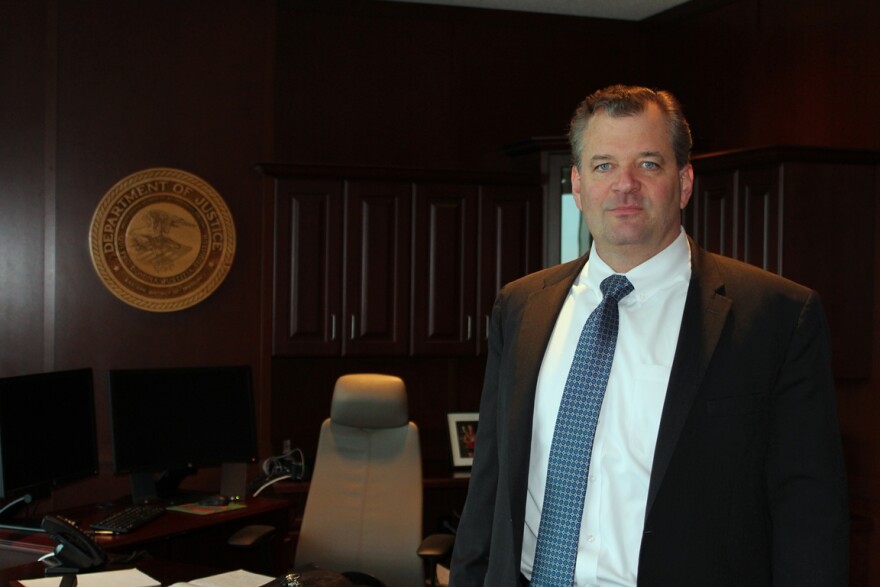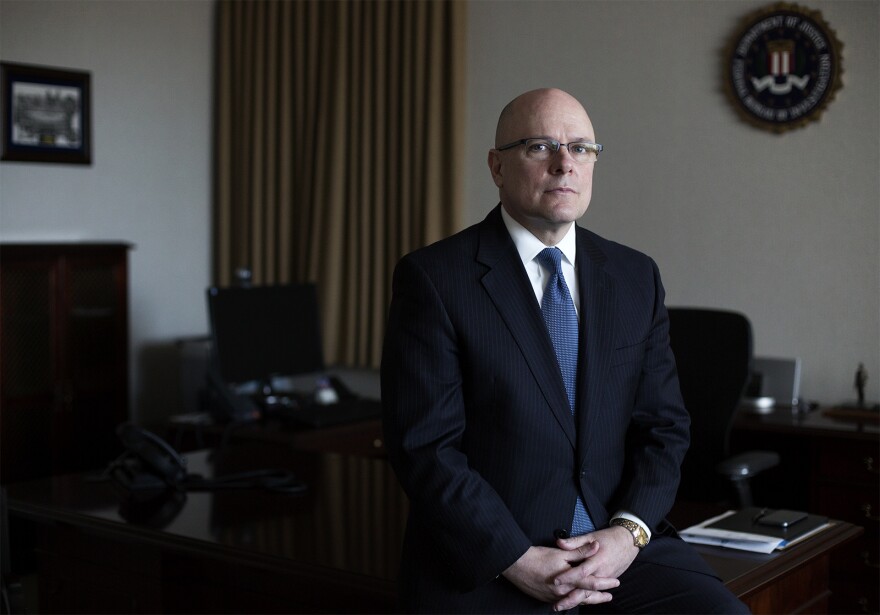2017 was a violent year in the St. Louis region. The St. Louis Metropolitan Police Department handled 205 homicides. St. Louis County detectives investigated 55 more.
Getting the 2018 numbers down is a priority for law enforcement at all levels, and the team leading that effort looks much different than it did last year.
Meet the new leaders
Col. John Hayden, chief, St. Louis Metropolitan Police Department
Hayden, a 30-year veteran of the department, was promoted to chiefon Dec. 28. He was a math major at Washington University, but was also always interested in the military.
“I believe that I could carry out orders, and those types of things, and I felt like I would do a good job if I had a clearly defined mission,” Hayden told St. Louis Public Radio last month.
The mission is clear, Hayden said — the department has to find a way to reduce violent crime in St. Louis. And he will be relying on his partners at the federal, state and local level to get the job done.
“There are some particularly heinous crimes that can be prosecuted on the federal level,” he said.
Jeffrey Jensen, the new U.S. attorney for the Eastern District of Missouri, attends the weekly review of crime statistics known as CompStat, Hayden said, “and certainly ensuring that persons get proper punishment for heinous violent crimes, I think that’s a way in which we could be partners.”
Jimmie Edwards, public safety director, city of St. Louis

Edwards got his law degree from Saint Louis University in 1982, and then spent about a decade in the private sector before being named a judge in the city. During his time as the chief juvenile court judge, Edwards openedInnovative Concepts Academy, designed to give the young defendants he saw in his courtroom a chance to graduate from high school.
Edwards was sworn in as public safety director Nov. 6 — his appointment was hailed by supporters and opponents of Mayor Lyda Krewson.
“We will work on reducing crime,” he told aldermen at a committee meeting on Jan. 17. “I’m not naive enough to believe that Commissioner [John] Hayden and I alone will reduce crime. This isn’t about ownership of solving crime. It’s about solving crime.”
Edwards has high praise for federal prosecutors who now handle gun cases that are more difficult to prosecute at the state level because of 2016 changes to Missouri’s gun laws. Federal agents are also patrolling alongside SLMPD officers in an area of north St. Louis where most of the violent crime is concentrated, and Edwards convened a task force to target carjackings.
Capt. Stephen Ferrier, command officer, Troop C, Missouri State Highway Patrol

Ferrier, a native of Virginia, came to the state to attend the University of Missouri, and later Northwest Missouri State University. He joined the Highway Patrol in 1991, and has spent his entire career in the footprint of Troop C, which covers 11 counties in eastern Missouri. He was promoted to captain and named commander of the troop on Oct. 1.
Back in July, Gov. Eric Greitens pledged state resources to help fight crime in St. Louis, including state troopers on the interstate highways. Though the number of patrols has dropped, a spokeswoman for the SLMPD says troopers are still on the interstates — assistance that Edwards, the public safety director, calls “important.”
Jeffrey Jensen, U.S. attorney, Eastern District of Missouri

Jensen’s path to the office on the 20th floor of the federal courthouse downtown is a winding one. He was an accountant with PriceWaterhouseCoopers before joining the FBI in the late 1980s. He spent his entire time as an agent in St. Louis, while going to law school at Saint Louis University at night, and then became a federal prosecutor, also in St. Louis, in 1999. He spent 10 years there before returning to the private sector doing compliance work and defense. He was confirmed to his current post Oct. 4.
"We’re all willing to look at the crime problem and think critically about what’s been going on differently and how we can better work together, and I think it’s becoming really effective and it’ll become more effective" at fighting violent crime, he said.
Richard Quinn, special agent in charge, FBI-St. Louis

Quinn, a Florissant native, joined the bureau in 1997, and was promoted to lead the St. Louis field office in mid November. He was posted in Philadelphia, Chicago, New York City, Washington, D.C. and overseas before coming home, including some time with the Joint Terrorism Task Force.
“That is exhibit A in the value of a task force,” Quinn said. “The idea behind a task force is you identify and work with federal, state and local partners, and leverage the resources and authorities in combating a particular threat. That’s what we’re trying to do here in St. Louis. We have a history of doing that, but it’s something that we can always continue to refine. I’m very confident that if we maintain that spirit of collaboration in addressing violent crime, we will be successful.
Fredric Winston, assistant special agent in charge, Bureau of Alcohol, Tobacco, Firearms and Explosives
Winston took over leadership of the St. Louis field office in October. Before that, he was with the agency in Tennessee, commandingthe Multi-Agency Gang Unit in Shelby County.
What is the impact of all that change?
Law enforcement is change by chance, said Steve Finkelstein, a senior partner and co-founder of the management consulting firm Experience on Demand. Rank-and-file officers don’t have much, if any, say in who becomes their commanding officer. But, most also don’t expect to work for the same chief their entire careers, especially at the federal level.
“Those organizations anticipate that change, and they’re more used to it,” Finkelstein said.
Six new law enforcement leaders since October is a swift and major change, said Bob Cropf, a professor of political science and public policy at Saint Louis University. But that level of turnover likely won’t be as disruptive as it would to other kinds of organizations.
“You can’t move from another field and take a management position in law enforcement,” Cropf said. “Because of that, there are multiple opportunities for networking and connections to occur.”
That’s the case in St. Louis. Edwards was a judge for nearly 30 years before stepping down from the bench to become public safety director. Hayden is a 30-year veteran of the department. U.S. attorney Jensen was an FBI agent here in the 1990s, and then a federal prosecutor until 2009.
“I’ve had great relationships for decades with many agents and many police officers in all of the police departments in this area, so it makes it much more easy for me to walk into a meeting and have candid conversations,” Jensen said.
Jensen welcomed the leadership turnover. So did the FBI's Quinn.
“It’s through that refreshment, and that creativity, and that initiative and discipline that gives me the confidence to think that yes, we can make an impact on the violent crime in this area,” Quinn said.
Follow Rachel on Twitter: @rlippmann


